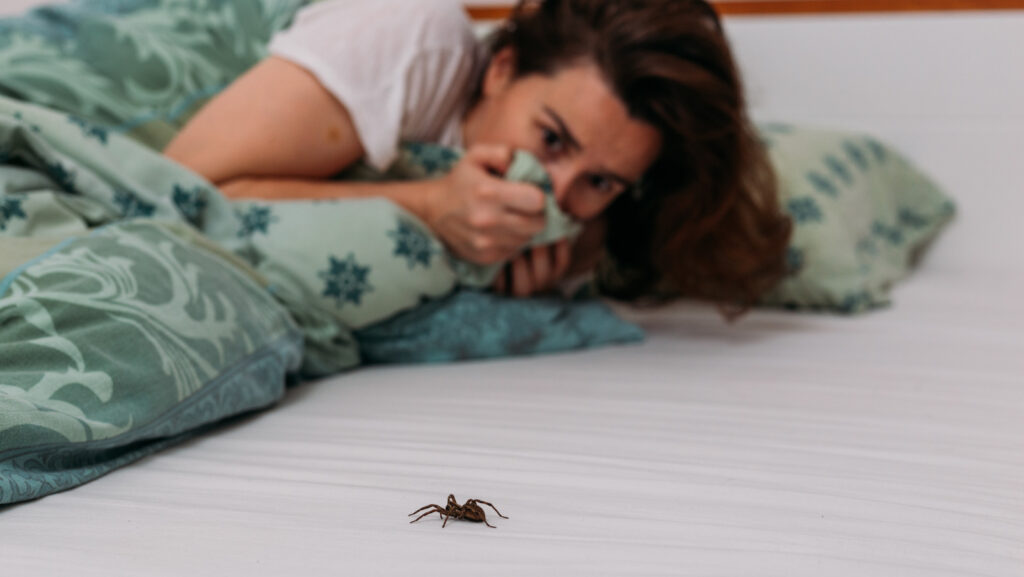Finding a spider in your bed can be a truly unsettling experience. The thought of these eight-legged creatures crawling around while you sleep can send shivers down anyone’s spine. However, understanding why spiders might choose your bed as their temporary home can help alleviate some of the anxiety and fear associated with this common occurrence.
This article will delve into the reasons behind spider infestations in beds, explore the factors that attract them to bedding, and provide practical tips on how to prevent these unwelcome guests from making themselves comfortable in your sleep sanctuary. We’ll also discuss common house spiders you might encounter and guide you through effective methods for removing them from your bed.
Why Spiders Choose Beds
Spiders are naturally drawn to dark, secluded spaces where they can feel safe and undisturbed. Your bed, with its soft blankets, pillows, and often-unoccupied state during the day, presents an ideal haven for these creatures. They seek refuge from bright lights and potential predators, finding comfort in the darkness and relative isolation of your bedroom.
Furthermore, spiders are opportunistic hunters, constantly on the lookout for food sources. Your bed can be a veritable buffet for them, as it often harbors dust mites, bed bugs, or other small insects that serve as their primary prey. The presence of these tiny creatures in your bedding creates an irresistible invitation for spiders seeking a meal.
Spider Attractors in Bedding

Several factors within your bedding can contribute to attracting spiders:
Dust Mites and Other Insects
Dust mites are microscopic creatures that thrive in warm, humid environments like mattresses and pillows. They feed on dead skin cells shed by humans and pets, making bedding a prime breeding ground for them. Spiders, being natural predators of these tiny insects, are naturally drawn to areas where dust mite populations are high.
Clutter and Debris
A cluttered bedroom with piles of clothes, books, or other items can provide ample hiding places for spiders. These undisturbed spaces offer shelter from light and potential threats, making them attractive nesting sites. Regularly cleaning your bedroom and decluttering can help reduce spider habitats.
Dampness and Moisture
Spiders prefer humid environments, so damp bedding or a poorly ventilated bedroom can increase the likelihood of encountering these creatures. Ensure proper ventilation in your bedroom and address any moisture issues to create an environment less hospitable to spiders.
Preventing Spiders in Your Bed
Taking proactive steps to prevent spiders from making your bed their home is crucial for maintaining a peaceful sleep environment:
Regular Cleaning and Vacuuming
Vacuuming your mattress, pillows, and surrounding areas regularly can remove dust mites, insect debris, and spider webs, effectively reducing the attractiveness of your bed as a habitat. Pay special attention to crevices and corners where spiders may hide.
Seal Cracks and Gaps
Inspect your bedroom for any cracks or gaps in walls, windows, or doors that could provide entry points for spiders. Sealing these openings with caulk or weather stripping can help prevent them from entering your home in the first place.
Reduce Clutter
Keeping your bedroom tidy and clutter-free eliminates potential hiding places for spiders. Regularly decluttering and organizing your belongings can make your bedroom less appealing to these creatures.
Identifying Common House Spiders

While encountering a spider in your bed can be unsettling, it’s important to remember that most house spiders are harmless. Some common house spiders you might encounter include:
- Common House Spider: These brown or gray spiders with long legs and a distinctive abdomen often build messy webs in corners and ceilings. They are generally shy and not aggressive.
- Wolf Spider: Larger than other house spiders, wolf spiders have hairy bodies and powerful legs. They hunt their prey rather than building webs and are known for their speed and agility.
How to Get Rid of Spiders in Your Bed
If you find a spider in your bed, don’t panic! Here are some safe and effective methods for removing them:
Gently Capture and Release
Using a cup or jar, carefully scoop up the spider and release it outside away from your home. This method avoids harming the spider while ensuring its removal from your bed.
Vacuuming
Vacuuming your mattress, pillows, and surrounding areas can effectively remove spiders and their webs. Dispose of the vacuum bag immediately after use to prevent the spiders from escaping.
Conclusion
While encountering a why was there a spider in my bed can be unsettling, understanding why they choose beds and taking preventive measures can significantly reduce the likelihood of these encounters. By maintaining a clean bedroom environment, sealing entry points, and reducing clutter, you can create a less hospitable habitat for spiders. Remember, most house spiders are harmless and play a beneficial role in controlling insect populations. If you do find a spider in your bed, simply capture it gently and release it outside to ensure both your peace of mind and the safety of these creatures.



